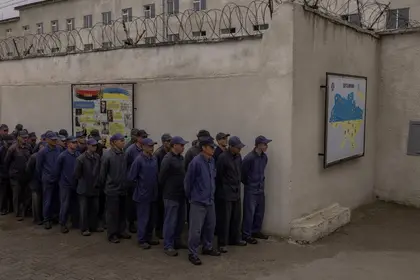Near Avdiivka, each day, a new swathe of Russian soldiers crawls towards Ukrainian positions through the muddy fields already strewn with the bodies of their compatriots.
Meanwhile, Russian artillery is diligently wiping the city off the face of the earth. While more than a thousand residents are still living in the basements of their apartment blocks, the population of Avdiivka shrunk recently when one hundred people finally agreed to evacuate. They were taken to the rear by Ukrainian police.
JOIN US ON TELEGRAM
Follow our coverage of the war on the @Kyivpost_official.
The police recently performed another special mission in the area together with volunteers from a Kharkiv Animal Rescue organization. In the spring, the Russians bombed a stud farm in the suburbs of Avdiivka, killing about 300 horses. Two of them escaped alive and ran into town, where they had been living among the ruins – traumatized and frightened of people.
Animal rescue volunteers brought a professional horse groomer and his horse to Avdiivka. As expected, the feral horse was put at ease by the visiting horse and the groomer was able to lead them into an enclosure from where they could be transported away from the front line.
A new batch of Russian prisoners of war (POWs) is also waiting to be sent away from Avdiivka. They are easier to transport than horses, but first, those who are not wounded undergo a series of interrogations to determine whether that soldier has committed any war crimes.

Now It’s Time to Pull Together – Surely?
After the verification process, a long journey of several days awaits the POWs. It usually ends in Western Ukraine, at the only functioning prisoner-of-war camp, Zahid-1, where some commentators say life is a little too comfortable.
Conditions at the Prisoner of War Camp
POWs rise at six in the morning, exercise, and then have breakfast. On their way to the dining hall, they pass portraits of historical Ukrainian figures, including the poet, Taras Shevchenko.
To cure the Russian soldiers of Kremlin propaganda, they are obliged to attend lectures on Ukrainian history. This cure has varying success. Some prisoners of war perceive it as the imposition of Ukrainian propaganda on them.
Since Russia froze the prisoner exchange process several months ago, Russian POWs are accumulating in Ukraine, as are Ukrainian POWs in Russia.
For now, Russian prisoners perform simple tasks, like taking apart wooden pallets and turning them into other simple wooden products. In their free time, they read and watch Ukrainian television channels, including the Russian-language state TV channel “Dom.”
Sometimes they talk to their relatives in Russia on the phone. There is also a library, mostly stocked with Soviet publications by Russian and Soviet authors.
In exchange for their work, prisoners of war receive a symbolic wage – about seven euros a month. There is a store in the camp where they can spend this money. The most popular product is Coca-Cola, which is no longer sold in Russia.
Among the Russian prisoners of war, there are ordinary mobilized soldiers, contract soldiers, and criminals who were released from prison in exchange for their commitment to fight against Ukraine.
These “professional” prisoners have tried to create the systems that they knew in their Russian prisons where inmates, and not the administration, set the rules and abuse less experienced prisoners.
The Ukrainian camp staff had to work hard to maintain control of the camp. Some POWs have been transferred to regular penitentiaries and they can now be found at 50 prison locations in Ukraine.
As the camp in Western Ukraine reaches capacity, a new one is being built in Vinnytsia region, in the southwest of the country and the construction of another camp is being discussed. No one knows when Russia will unfreeze the exchange of prisoners of war.
How well do we feed Russian POWs?
Not all Russian prisoners of war are eager to return home. They know that they will be sent back to the front. Here in Ukraine, it’s safe and, according to information on the Ukrainian Government website, POWs are rather well-fed.
Indeed, the tender announced by the state for the purchase of food for Russian POWs has caused outrage among many Ukrainians.
Member of Parliament Sergiy Rudyk, a historian and lieutenant colonel in the Ukrainian army, addressed the Minister of Justice Denis Malyuska saying:
“We purchased more than 100 thousand hryvna’s worth (about 2900 euros) of sweets and chocolate alone. And I only looked at the first few pages of government procurement for September!... Dozens of varieties of expensive sausage, cheese, coffee!...
“People, are you crazy? Is this how you feed Russian prisoners of war or are you just stupidly and cynically stealing?”
No response has come from the Minister of Justice, but perhaps Sergiy Rudyk did not expect one. This was his cry from the heart.
Recently, one of the Russian POWs even had a visit from his wife.
Some Ukrainians joke morosely that soon prisoners of war will be taken to the theater and out on excursions, while there is evidence that Ukrainian POWs in Russia are kept on starvation rations, bullied, and subjected to torture.
All Ukrainians remember the video of the prisoner exchange when a thin, exhausted Ukrainian soldier wept after receiving an apple as a gift from those who greeted him.
This camp is probably the safest place for prisoners of war, and they are unlikely to want to go beyond its boundaries. After all, there are people living nearby who lost loved ones in this war. Their reaction to the appearance of Russian POWs on their streets would be difficult to predict.
The views expressed in this opinion article are the author’s and not necessarily those of Kyiv Post.
You can also highlight the text and press Ctrl + Enter










